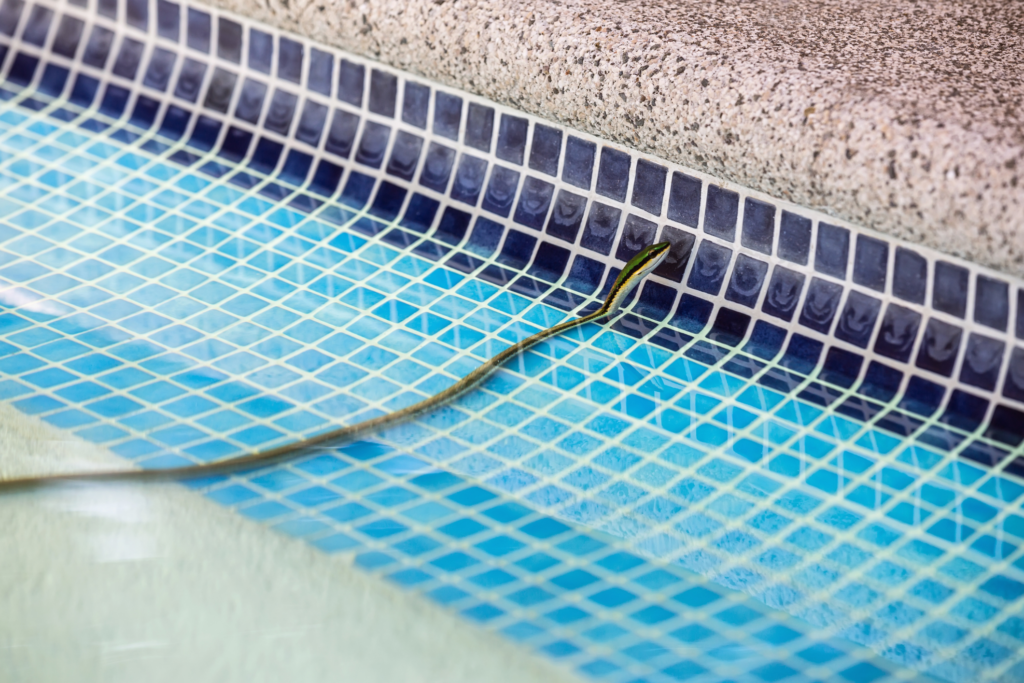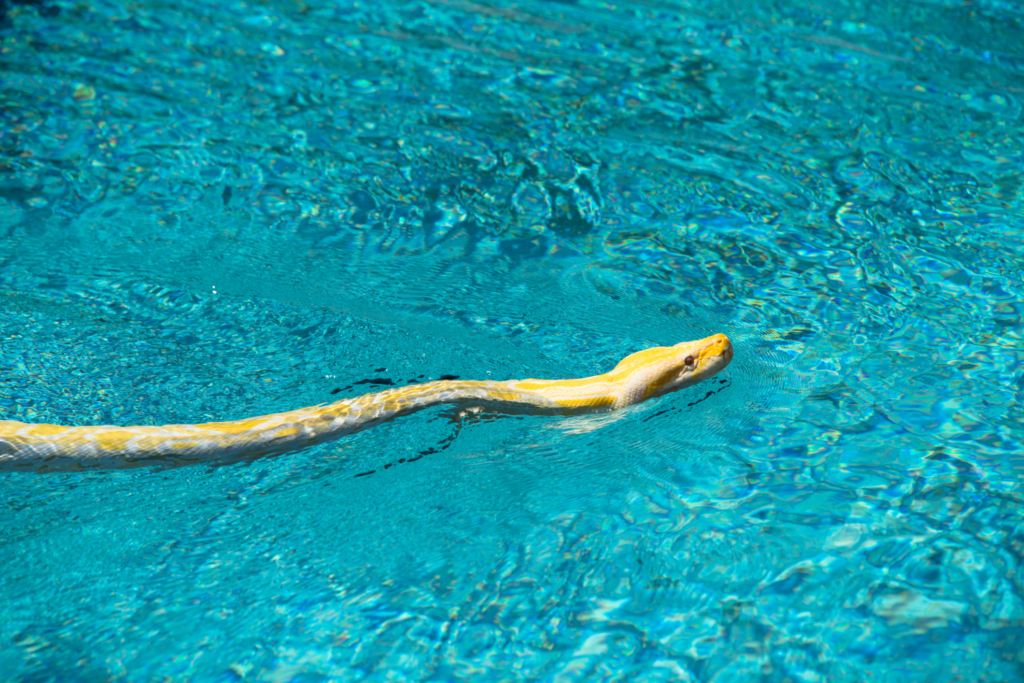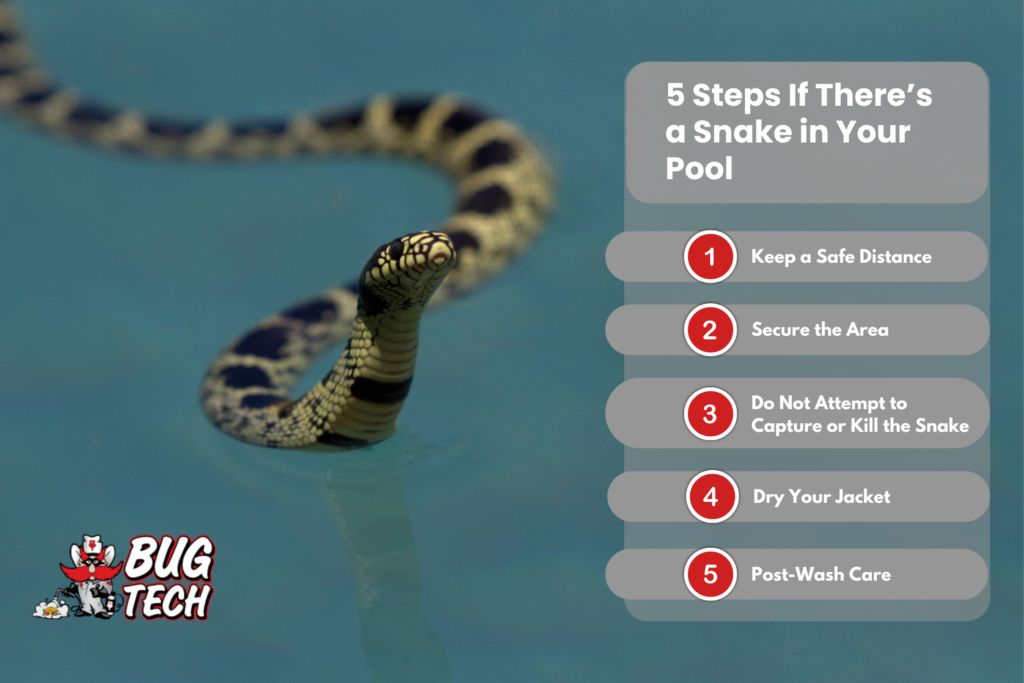How to Handle a Snake in Your Pool: Safety Tips and Prevention

Finding a snake in your swimming pool can be an alarming experience. Whether the snake is simply passing through or has mistaken your pool for a natural water source, it’s important to handle the situation calmly and safely. Remember, while most snakes found in residential areas are harmless, others can be venomous, so maintaining a safe distance is crucial.
Why Do Snakes End Up in Pools?
Snakes are drawn to pools primarily for hydration, cooling down, or hunting. Especially in hot climates like Texas, a pool might appear to be a convenient spot for a snake to escape the heat.
Common Reasons Snakes Visit Pool Areas
- Water Sources: During dry periods, natural water sources can become scarce. Pools then become attractive as alternative sources of water for snakes.
- Prey Hunting: Pools can attract various types of wildlife, such as frogs and insects, which are potential food sources for snakes. A pool with prey will attract these reptiles looking for a meal.
- Shelter and Solitude: Snakes often seek quiet, undisturbed places to rest. Pools and skimmer baskets provide a cool, secluded environment.
Identifying the Species of Snake in Your Pool

Before taking any action, it’s crucial to identify whether the live snake in your pool is venomous or non-venomous. This knowledge directly influences how you should handle the situation, emphasizing the need for safety and potentially urgent responses.
Key Features to Observe
- Head Shape: Venomous snakes often have a triangular-shaped head, wider at the back and attached to a narrow neck. Non-venomous snakes typically have a more uniform headwidth.
- Color and Patterns: While this can be more challenging to discern, venomous snakes often have distinct, bold patterns that serve as warnings to predators. Non-venomous snakes might have more subdued coloring.
- Behavioral Clues: Venomous snakes are often more aggressive when threatened and may coil up and hiss. Non-venomous snakes are usually more likely to flee or remain still.
Tools and Resources for Identification
- Smartphone Apps: Several apps can help you quickly identify a snake from a safe distance by uploading a photo.
- Local Wildlife Guides: Familiarizing yourself with local wildlife guides can provide valuable information on the types of snakes common in your area.
The Role of Professional Help

Understanding what type of snake you’re dealing with is crucial for ensuring your safety and deciding the next steps. If you’re unsure about the type of snake or how to deal with it safely, it’s best to call a professional wildlife removal service.
Safe and Immediate Steps to Take
Discovering a snake in your pool requires an educated response to ensure safety.
- Keep a Safe Distance: The first rule when encountering any wildlife, especially snakes, is to maintain a safe distance. Snakes can strike at a range of up to half their body length, and getting too close could provoke an attack. Additionally, when threatened, some snakes may release a foul-smelling musk as a defense mechanism to deter potential threats.
- Secure the Area: Keep children and pets away from the pool area. This minimizes the risk of unexpected interactions that could lead to harm.
- Do Not Attempt to Capture or Kill the Snake: Trying to handle the snake yourself can lead to injury or stress the animal further, potentially making it more dangerous. Using your pool skimmer to scoop these little guys out may be tempting, but the risk is just too high. Depending on local wildlife protection laws, killing a snake can also be illegal.
- Call Wildlife Removal Services: Contact a professional wildlife removal service like Bug Tech once the area is secure. According to local regulations, these experts can safely capture, relocate, or handle the snake.
- While Waiting for Help: Monitor the snake’s location. If possible, keep the snake in sight from a safe distance. This can help the arriving professionals locate it quickly.
Post-Removal Check
- After the snake has been safely removed, it is wise to inspect your pool area for potential snake attractants or entry points. Look for overgrown vegetation, holes in fencing, or debris piles that might harbor rodents or other prey.
Preventive Measures to Keep Snakes Away from Your Pool
Preventing snakes from entering your pool area involves a combination of habitat modification and vigilant maintenance. Here are practical steps to discourage snakes from considering your pool as a viable habitat:
- Maintain a Clean Backyard: Keep your garden and pool area clean and free of debris. Piles of leaves, lawn clippings, tree branches, and stacked wood can provide shelter for snakes and their prey. Regularly mowing your lawn and removing potential hiding spots can make your property less attractive to snakes.
- Seal Gaps and Openings: Check for and seal any gaps or cracks in your fencing, pool covers, pool liner, and home walls. Snakes can squeeze through surprisingly small openings, so blocking potential entry points is important.
- Use Snake Repellents: Various commercial snake repellents can deter snakes from entering your property. These typically use unpleasant smells. However, their effectiveness can vary and should be used as part of a broader snake prevention strategy.
- Modify Landscaping: Avoid overwatering your lawn, as excess moisture can attract snakes by bringing in frogs and other prey. Use gravel or hardscaping near the pool instead of thick plant cover, which can provide hiding spots for snakes.
- Install a Perimeter Fence: A solid fence with no gaps can act as a physical barrier to snakes. The fence should be buried a few inches into the ground and should stand several inches above ground level to discourage snakes from crawling over or under it.
- Reduce Food Sources: Control rodent populations and other small pests on your property. Snakes often enter human habitats in search of food. Ensuring that there are fewer rodents around your home and pool will make your property less inviting to snakes. Additionally, do not leave pet food outside, as this can also attract snakes.
- Water Features and Management: If you have water features other than the pool, like ponds or fountains, keep them clean and free of overgrowth. These can also attract snakes if not properly maintained.
- Chlorinated Pools Over Natural Swimming Pools: The presence of chlorinated water in pools may help deter snakes, as they generally avoid chemically treated water.
- Regular Inspections: Periodically inspect your pool area and surrounding yard for signs of snakes or their prey. This includes checking under poolside furniture, within pool skimmers, and around pool heating equipment.
When to Call a Professional and the Benefits of Choosing Bug Tech

Dealing with snakes in your pool area requires more than just DIY measures. Whether you’re dealing with a potentially venomous snake or frequent snake appearances that suggest a larger infestation, the best thing to do is call professional wildlife removal services.
Choosing Bug Tech for snake removal comes with several advantages. Our team of experienced technicians is well-versed in identifying various snake species and understanding their behaviors, which is critical for safe and humane handling. Based in Lubbock, Texas, Bug Tech has in-depth knowledge of local wildlife, enabling them to provide effective and region-specific solutions. They use humane methods for capturing and relocating wildlife, ensuring that the animals are treated ethically and the local ecosystem is preserved. Additionally, Bug Tech offers preventive solutions to help avoid future wildlife issues, providing more than just immediate relief but also long-term protection.
If you find yourself needing help with a snake in your pool, reaching out to Bug Tech not only resolves the immediate problem but also contributes to your ongoing safety and comfort. Our professional services ensure that any wildlife encounters are handled with expert care, keeping your home and its surroundings safe and peaceful. Whether it’s an urgent removal or preventive strategy, Bug Tech is prepared to assist you with all your wildlife control needs.
